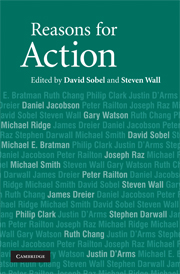Book contents
- Frontmatter
- Contents
- Notes on the contributors
- Acknowledgments
- 1 Introduction
- 2 Intention, belief, and instrumental rationality
- 3 Reasons: practical and adaptive
- 4 The explanatory role of being rational
- 5 Practical competence and fluent agency
- 6 Practical conditionals
- 7 Authority and second-personal reasons for acting
- 8 Promises, reasons, and normative powers
- 9 Regret and irrational action
- 10 Mackie's motivational argument
- 11 The truth in Ecumenical Expressivism
- 12 Voluntarist reasons and the sources of normativity
- Bibliography
- Index
2 - Intention, belief, and instrumental rationality
Published online by Cambridge University Press: 05 May 2010
- Frontmatter
- Contents
- Notes on the contributors
- Acknowledgments
- 1 Introduction
- 2 Intention, belief, and instrumental rationality
- 3 Reasons: practical and adaptive
- 4 The explanatory role of being rational
- 5 Practical competence and fluent agency
- 6 Practical conditionals
- 7 Authority and second-personal reasons for acting
- 8 Promises, reasons, and normative powers
- 9 Regret and irrational action
- 10 Mackie's motivational argument
- 11 The truth in Ecumenical Expressivism
- 12 Voluntarist reasons and the sources of normativity
- Bibliography
- Index
Summary
TWO APPROACHES TO INSTRUMENTAL RATIONALITY
Suppose I intend end E, believe that a necessary means to E is M, and believe that M requires that I intend M. My attitudes concerning E and M engage a basic requirement of practical rationality, a requirement that, barring a change in my cited beliefs, I either intend M or give up intending E. Call this the Instrumental Rationality requirement – for short, the IR requirement.
Suppose now that I believe that E, and I also believe that E will only occur if M. My beliefs engage a basic demand of theoretical rationality, a demand that, roughly, either there be a change in at least one of these two beliefs or I believe M. Call this the Belief-Closure requirement – for short, the BC requirement. BC, note, is not a consistency demand on my beliefs: failure to add the further belief that M need not involve inconsistency in the way that adding a belief that not-M would. Nevertheless, something like BC seems a basic rationality constraint on belief.
Both IR and BC express constraints on the coherence of the agent's relevant attitudes; and these constraints are aspects of the normal rational functioning, in the psychic economy of believing-and-intending agents, of the cited attitudes. The intentions and beliefs of such agents will tend to be responsive to these constraints. But the requirements differ in important ways.
- Type
- Chapter
- Information
- Reasons for Action , pp. 13 - 36Publisher: Cambridge University PressPrint publication year: 2009
- 26
- Cited by

